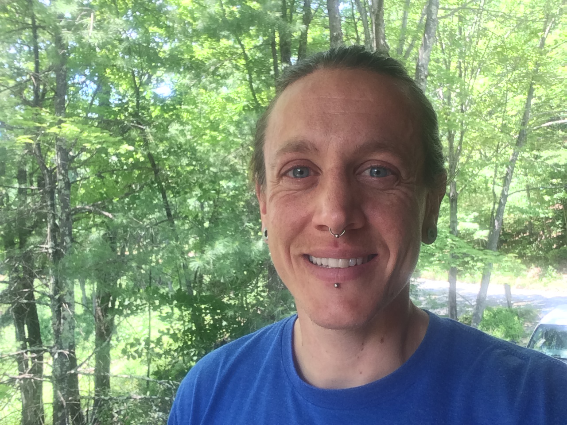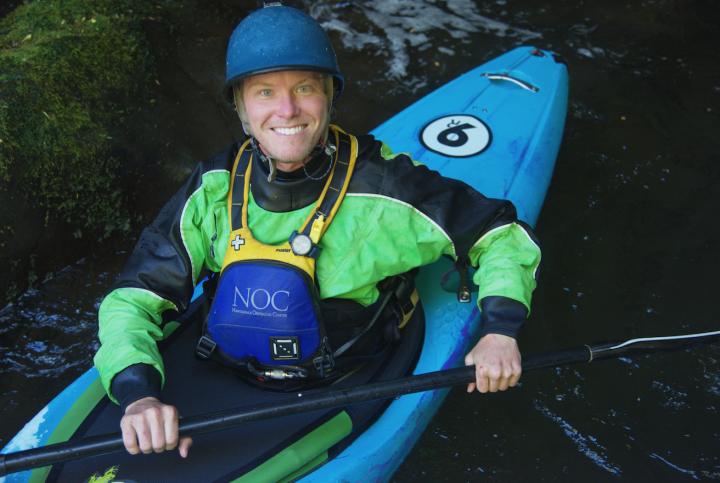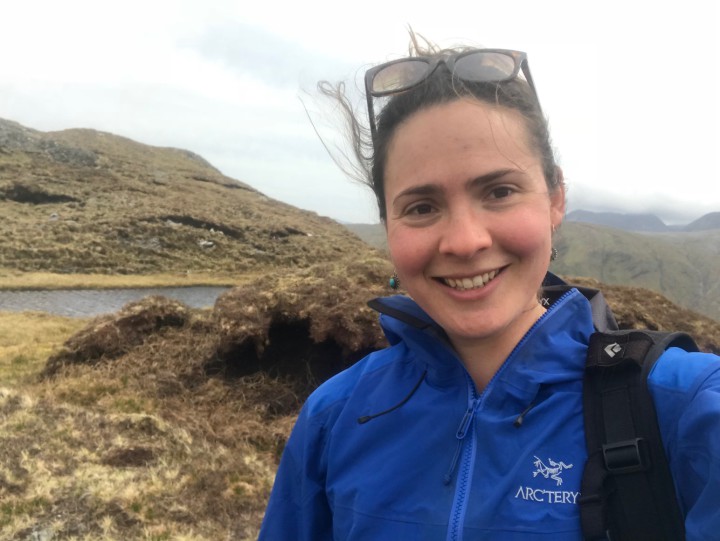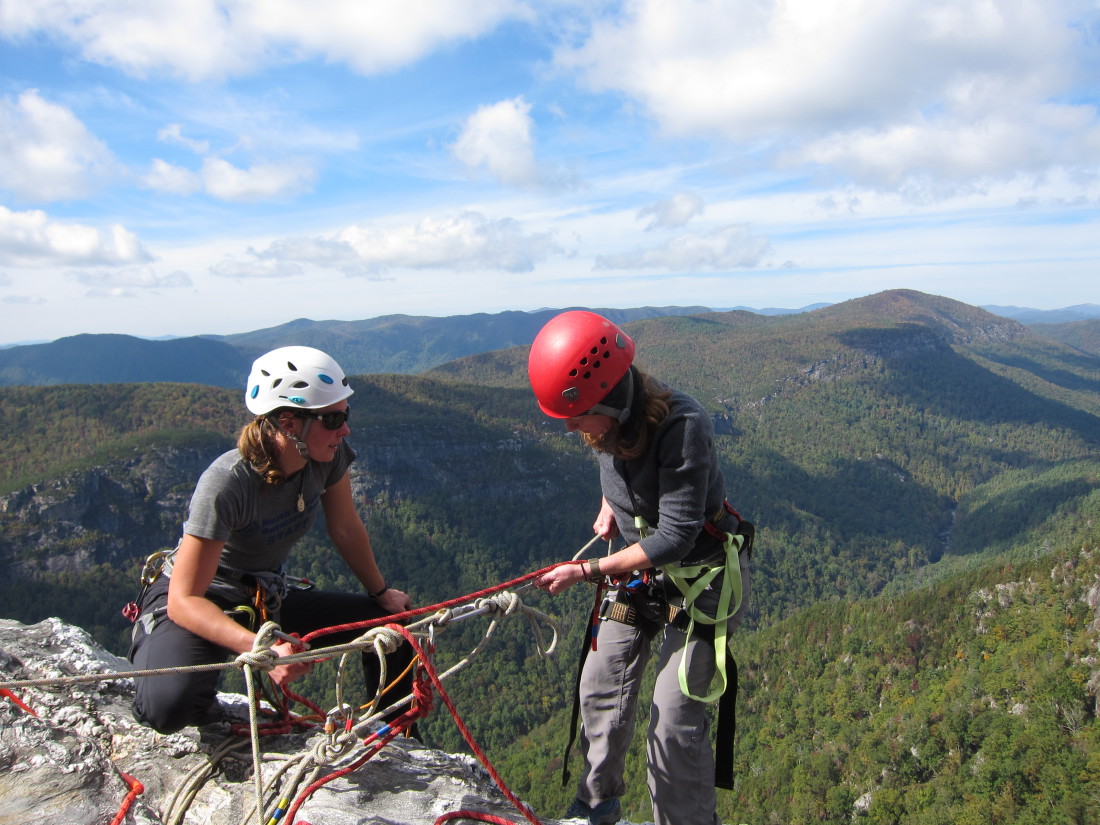Eli Mills hasn’t paid rent since 2011. During most of those seven years, the 34-year-old has called Western North Carolina home. As a seasonal employee at the North Carolina Outward Bound School, Mills gets room and board throughout his nine-month stint, which runs from mid-February to early November. Come winter, however, he typically lives out of his Honda Fit, roaming the country in search of adventure or visiting family in Iowa.
“It’s actually cheaper to travel than it is to stay in Asheville and pay rent,” Mills reveals. During the offseason, he rarely spends money on accommodations, opting instead for free camping on properties overseen by the Bureau of Land Management.

Such freedom has its perks, but the lifestyle also carries its fair share of challenges and potential pitfalls, notes Mills. To begin with, it takes a lot of planning to line up winter work and manage one’s money so it lasts through the offseason. Relationships can also be tricky with a schedule that may keep a person out in the woods for weeks or even months at a time. And for those new to the industry, there’s often a lingering anxiety that comes with not knowing where they’ll be once the weather turns cold.
Employers, of course, face similar uncertainties. “We’re not going to be able to go toe-to-toe with a full-time job that offers benefits,” says Devin Kearns, staff recruitment manager at Outward Bound. Accordingly his organization, like others in the region, offers a number of financial incentives and additional networking opportunities as a way of encouraging qualified staff to come back year after year.
But for Mills, it’s ultimately the flexibility and the chance to pursue his passions that keep him returning to the mountains every February. And he’s not alone.
“It feels like a migration of birds,” he explains. “Every year we come up on the mountain in the very early spring, and slowly, people start trickling in from whatever adventure or work they’ve had over the last few months. Stories are swapped, and hugs exchanged. Everyone wants to know: Where have you been? What have you been up to? And what have you learned?”
Autonomy trumps predictability
In 2017, North Carolina’s amusement and recreation industries peaked in the third-quarter (summer season), according to the state Department of Commerce’s Quarterly Census of Employment and Wages. Buncombe County alone averaged 1,201 employees in those sectors. The data doesn’t distinguish between seasonal/part-time and full-time employment. But the fourth-quarter (autumn) average is 1,039 employees, a drop of nearly 200 positions. Neighboring counties show a similar pattern.
This is certainly the case for Sara Bell, co-owner of Green River Adventures and The Gorge zip line canopy tours, both based in Saluda. Together, the two businesses employ 78 people, roughly 50 of whom, she says, are seasonal. Peak employment typically runs from Memorial Day to Labor Day weekend.
Since launching Green River Adventures in 2007 (The Gorge followed in 2013), Bell says she’s noticed a shift in employee outlook. “When I started this business, there was this intense pressure to make sure every single employee had full-time [seasonal] work,” she recalls. “But this generation of millennials, they much prefer flexibility over set work schedules.”
To accommodate this growing trend, Bell has incorporated scheduling apps that enable employees to swap shifts among themselves. “In some ways it’s a massive headache for us,” she admits. But it appeals to her staff’s passion for autonomy, which helps retain valued team members long term.
Across oceans and hemispheres
Among the perks such companies offer to attract and cultivate relationships with seasonal workers are room and board, subsidized housing, meal plans, referral bonuses and educational reimbursements. Partnerships are yet another effective strategy.
The Nantahala Outdoor Center, for example, has an ongoing arrangement with the Pucón Kayak Hostel in Chile, which offers similar outdoor adventure programs. NOC recruiter Colleen Hickey says the relationship has significant advantages for both businesses: NOC helps the Chilean operation expand its clientele base, and in return, the hostel gives some of NOC’s instructors offseason employment. All the while, adds Hickey, “This is achieved without having to invest in infrastructure and assets in a foreign country. … It is a massive win for both parties.”

NOC kayak instructor Curtis England is one of those staffers who divides his time between two hemispheres. Besides the financial security the arrangement creates, he points out, it helps instructors expand their overall skill set. “You can never truly master the ability to teach someone such an active and dynamic skill as whitewater kayaking,” he maintains, adding, “We’re constantly learning ourselves.”
Other companies offer similar programs. Outward Bound provides winter options via satellite camps in Everglades City, Fla., and Patagonia, located at the southern end of South America.
Bell, meanwhile, is in the early stages of developing a partnership with a zip line tour company on the coast of New Zealand. “From a business owner’s perspective, it would be such a perk,” she says. “It’d be a really cool draw for us to say, ‘If you get trained here and you get accepted into this program, we can help facilitate you to go live in New Zealand for six months.’”
Besides “keeping staff’s skills fresh and sharp by working for another quality organization that offers similar work in the winter,” she continues, such an arrangement would give seasonal workers a more seamless transition back to the WNC mountains come spring.
Humble pie
Sometimes, however, a change of scenery can create initial hiccups. Erin Schaberg, who’s been with Outward Bound since 2015, divides her time among its WNC, Florida and Patagonia camps. “I think some of the biggest slices of humble pie have been thrown at me through this work,” the 26-year-old says.
After her most recent winter in the steamy flatlands of Everglades City, Schaberg says it took some time to readjust to backpacking through spring snow in WNC. “It reacquainted me with the feelings that a lot of our students experience when they’re being pushed outside their comfort zones” and learning new skills in a kind of “trial by fire,” she says.

But for Schaberg and other seasonal employees, it’s that very push that attracts them to the lifestyle in the first place. It’s also what keeps the work interesting. “You get to know people really well in challenging circumstances,” she says. “You learn how they respond and what they’re like when they’re breaking down.”
Of course, those intense bonds are almost always short-lived, ranging from a few hours to a few days, a couple of weeks or, at most, a couple of months. “For better or for worse, we go through it all the time,” says Schaberg. “Getting really close to people and knowing them really well, and then saying goodbye and knowing we’ll never see them again.”
Over time, she notes, those experiences have changed the way she interacts with her students. “I meet new students and … they remind me of students I’ve had before,” Schaberg explains. “It’s not a less personal connection, but it feels a step removed. I don’t mean that in a dark, isolated kind of way. But you start to see patterns. … That’s been the most surprising part: how everyone is unique, but there are also a lot of patterns in people that you can assess and learn to work with.”
Looking ahead
Patterns play an important role not only in bonding with new students but also in creating a more viable lifestyle. Particularly for folks just starting out in the field, who may lack the kind of network that evolves over time, it’s imperative to look two seasons ahead, counsels Outward Bound lead instructor and course director Ryan Kingrey. “It’s summertime now, but you’ve got to have a couple of applications out to other organizations for the fall and winter,” the 26-year-old explains, to avoid succumbing to panic once the season ends.
Creating routines also helps maintain social and family ties, he continues. It can be as simple as scheduling phone conversations at set times each week when that’s feasible or writing letters while out in the backcountry.

Socially, one of the major challenges is the inconsistent nature of the work. Although there may be predictable patterns day to day, variations in one’s weekly or monthly schedule can be harder to explain to outsiders. Mills, for example, says that during his longer stints in the woods, friends and family generally just assume he’s “fallen off the face of the planet and won’t exist for a while.”
Erratic schedules and distance can be harder, however, for those in romantic relationships.
Chris Gaillard, 31, divides his time between The Gorge in Saluda and working as a ski instructor in Park City, Utah. But this past winter, he opted to stay back east, working in a managerial position at The Gorge. His girlfriend, he notes, “doesn’t like me going out west as much as I wish I could. But I’m sure we’ll work something out to where I can go this winter.”
England, who’s also in a relationship, believes marriage and children are usually what steer seasonal employees toward more conventional jobs. “When people start wanting to have kids, it gets a little harder to live this kind of lifestyle and be constantly moving around,” he concedes. “I think that’s when a lot of people start leaving the seasonal life.”
Money matters
Ultimately, though, financial management may be the most essential skill for those hoping to sustain a seasonal lifestyle. For 13 years, Justinn Steffe has worked summers on the water for Outward Bound. The remainder of the year she teaches paddling and business courses at Warren Wilson College. She also leads financial workshops for a number of organizations that employ seasonal workers.
Last year she hosted seven such programs at Outward Bound. Topics ranged from savings to debt management to different options for paying off student loans. Financial planners, says Steffe, typically recommend that people save a minimum of 10 percent of their annual income. She advises seasonal workers, however, to aim for more like 20-40 percent.
“I’ve noticed that a lot of folks who’ve worked in this seasonal role have a lot of stress around finances, and then that stress leads to them not wanting to think about it or talk about it,” she explains. “But I’ve found that once you sit down and meet with someone, make a plan and kind of look it in the eye, a lot of that stress goes away.”
Steffe adds that folks in a lower income bracket need even greater discipline to meet their financial goals. Yet with the right approach, she maintains, those goals may still be achievable. “It’s important to really understand, one, where your money goes every month, and two, how to capitalize on the things that are afforded to you that other people aren’t getting, such as free housing and free food,” she points out. “These tend to be the two biggest expenses most Americans have. If you don’t take advantage of those things, then it can be really challenging to feel like you’re getting ahead.”
Of course, not all employers offer free room and board, and in such instances, economy must outweigh comfort. When Gaillard does head west in the winter, his job in Park City doesn’t provide him with a place to stay, so from spare rooms to finished basements, he’s seen it all. “I’m really fine just sleeping on a couch,” he says. “When I’m out that way, it’s all about living cheap as a way to get to the mountains.”
Hard choices
Employee longevity varies from business to business. On average, Outward Bound’s instructional staffers return seasonally for 5.3 years. Over at The Gorge/Green River Adventures, on the other hand, only about 10 of Bell’s roughly 50 seasonal employees are fully committed to the lifestyle, she reports. The rest are typically retirees or college students on summer break.
Yet for some, the very notion of giving up the lifestyle seems hard to fathom. “When I’ve been away from wilderness work, I’ve felt stifled and just not myself,” Mills explains. Others, however, say they’ve pondered a life less wild.
“I think about it all the time,” says England. “Maybe at some point I do need to get a more traditional job so I can earn a better paycheck. For me, personally, I have a lot of student loan debt. It’s not really going anywhere.”
For Schaberg, though, the end is nowhere near in sight, however much her current lifestyle may differ from her original plans. “I kind of walked into this life thinking I would take a year off before going to grad school,” she says. “I’m four years in now, and I feel like there are so many more avenues and opportunities for me to try new things and have new experiences and gain new skill sets. I guess what I mean to say is, I didn’t tap out like I thought I would.”
Gaillard, meanwhile, says his years working seasonal jobs have made one thing abundantly clear: All things come to an end, but not all endings are bad. “You can’t do it forever,” he maintains. “I’m just trying to ride it out as long as I can. It’s been good so far.”






Before you comment
The comments section is here to provide a platform for civil dialogue on the issues we face together as a local community. Xpress is committed to offering this platform for all voices, but when the tone of the discussion gets nasty or strays off topic, we believe many people choose not to participate. Xpress editors are determined to moderate comments to ensure a constructive interchange is maintained. All comments judged not to be in keeping with the spirit of civil discourse will be removed and repeat violators will be banned. See here for our terms of service. Thank you for being part of this effort to promote respectful discussion.